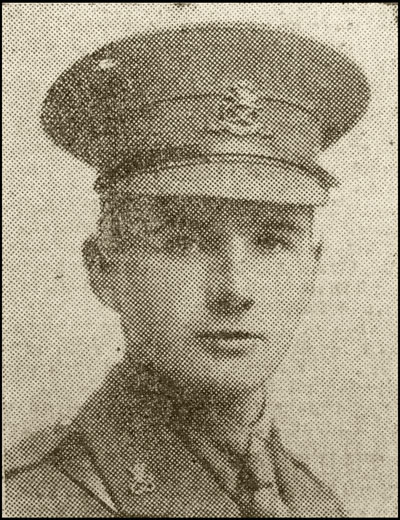![]() In memoriam
In memoriam ![]()
Lieutenant Robert Campbell Russell

Robert Campbell Russell was born on 15 April 1889 at 95 My Lady's Road, Belfast, the fifth and last child of clerk and warehouseman Alfred Russell and his wife Sarah Ellen (nee Robinson). He also had two half-sisters from his father's previous marriage. Robert's mother died in 1906, his father two years later and his oldest brother Alfred Henry in 1909. By 1911 he was living with his sisters Jane and Mary, and Jane's husband David Frederick Moore, at Cregagh, East Belfast, and working as a warehouseman in the wholesale drapery business. They later moved to The Croft, Whitehead, Robert working for the firm Messrs Lindsay Brothers, Donegall Place, Belfast.
Russell enlisted in the North Irish Horse at Belfast on 9 October 1914 (No.1297). The previous day he had applied for a commission in the Royal Irish Rifles, but for some reason this was not accepted. He was promoted to lance corporal on 9 February 1915 and corporal the following June.
In mid-year Russell embarked for England with B Squadron, finding billets at Lawn Park Camp, Apsley End, near Hemel Hempstead, while awaiting orders for France. On 23 July he applied for a commission in the 7th (Service) Battalion, North Staffordshire Regiment. He was appointed 2nd lieutenant on 16 August.
Russell embarked for overseas service on 14 May 1916, arriving at Basra in the Middle East a month later and joining his regiment in the field on 8 July. However a month later he was hospitalised, having contracted typhoid. He was shipped to India for treatment. On his recovery Russell returned to his regiment, joining it in the field on 19 May 1917. Four months later he was again hospitalised, at Bagdad, this time for just a month.
Russell was promoted to lieutenant on 1 July 1917.
In July 1918 Russell was sent with his battalion to North Persia to join the Dunsterforce expedition, helping in the defence of Baku from Turkish forces. He was slightly wounded in action on 26 August and then more seriously in the fighting five days later. He died in the Military Hospital at Baku on 31 August.
Some months later the Belfast News-Letter reported:
The officer commanding his battalion writes:- "He did most exceptional and gallant work on that day (31st August), and also on a previous occasion. I had given him a special job to cover the retirement of another unit in case they were forced back. He did this so well that the unit had practically no casualties in the retirement. He was one of the last to leave the position, and was hit in the body just before coming away. He was carried in by one of our men, Private ____, a long distance, and these two were the actual last to leave. I saw him in the ambulance on his way to the Russian hospital train, and had a word or two with him. He died the same evening in the British hospital in town."
Russell was buried in Baku British Military Cemetery, Plot 1, Row A, Grave 13, in what is now Azerbaijan. The cemetery was destroyed during the Soviet era. He is now commemorated on the Baku Memorial.
Lieutenant Russell was mentioned in the despatch of Lieutenant-General Sir W.R. Marshall, commander in chief of the Mesopotamian Expeditionary Force, on 7 February 1919.
Image of memorial kindly provided by Steve Rogers, Project Co-ordinator of the The War Graves Photographic Project, www.twgpp.org. Image of Lieutenant Russell from the Belfast Evening Telegraph kindly provided by Nigel Henderson, Researcher at History Hub Ulster (www.greatwarbelfastclippings.com).

